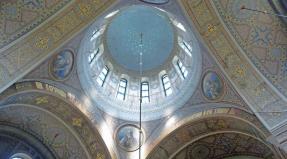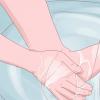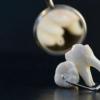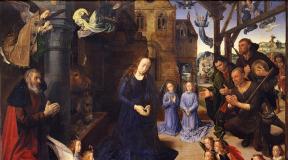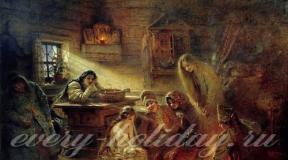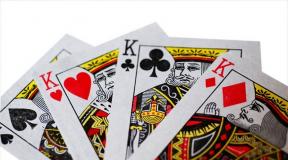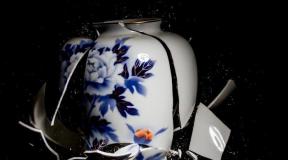The last days of Vladimir Solovyov. From the heritage of the Russian philosopher Vl
The last days of Vladimir Solovyov
The death of Vladimir Sergeevich Solovyov turned out to be a deep shock for Russian society, which left an imprint on the spiritual life of the Russian intelligentsia in the following decades. "He was a truly great Russian man, a brilliant personality and a brilliant thinker, not recognized and understood in his time, despite the general fame and the relative, sometimes brilliant success that he enjoyed" ( Trubetskoy S.N.Death of V.S. Soloviev on July 31, 1900 // Book about Vladimir Soloviev. M., 1991, p. 295.), - wrote one of the closest friends and students of the philosopher S.N. Trubetskoy. The last days of Solovyov, spent by him in the Uzkoye estate near Moscow (For more details about the history of this place, see: M. Podmoskovnaya Narrow: The estate and its owners. Artistic collection of the estate. // Our legacy. 29-30, pp. 126-145.), Can be compared with the death of Pushkin and Tolstoy. Even during his lifetime, the philosopher LM Lopatin characterized Solovyov's worldview as a "philosophy of the end." The death of the philosopher, as it were, colored his creative path and spiritual experience with a certain eschatological tonality. Public interest in his personality and worldview has sharply increased. Numerous publications appear about Solovyov, about meetings with him, interpretation of his thoughts and works. Most of those who have ever, at least for a short time, found themselves in the Solov'ev circle of friends, tried to tell about this, adding new touches to his biography. There were a lot of those who directly witnessed the extinction of the philosopher. Firstly, this is the family of S.N. Trubetskoy and the children of the owner of the estate, Pyotr Trubetskoy, who was absent at that time; friends of Solovyov, including: Agrafena Mikhailovna Panyutina, lawyer Nikolai Vasilyevich Davydov, who came with him to Uzkoye, and historian Vasily Osipovich Klyuchevsky; doctors who treated a dying person; his mother Poliksena Vladimirovna Solovyova and sisters; a local priest who accepted the last confession of a philosopher; the servant who was in the main house of the estate, and the sisters of mercy. Six of those present left us their testimonies of those days, which confirms their awareness of not just the vital, but the special spiritual importance of this moment. The first memories of the time of creation belong to S.N. Trubetskoy. They were written in Uzkoye on August 12 of the same 1900, and were first published already in the September issue of the "Vestnik Evropy" magazine under the title "Death of V.S.Solovyov on July 31, 1900" In 1910, in the newspaper "Moskovskie vedomosti" (issue dated November 3), there appeared memoirs about Solovyov's confession, written by the priest SA Belyaev, the former rector of the church in the village of Uzkoye. This material was included in the letter of another Orthodox priest N.A. Kolosov as a response to the story of the former Uniate priest N.A. Tolstoy about Soloviev's transition to the Greek Catholic (Uniate) Church. (It was published in the newspaper "Russian Word", shortly before). Without going into polemics on this issue, we only note that, in our opinion, the philosopher himself would hardly want to categorically define his confessional affiliation. Back in 1892, in a letter to V.V. Rozanov, who later became one of his most implacable opponents, Vladimir Soloviev spoke about it as follows: “The religion of St. Spirit is broader and at the same time more meaningful than all individual religions: it is neither a sum nor an extract from them. as a whole person is neither the sum nor the extract of his individual organs "( Soloviev B.C.Letters from Vladimir Sergeevich Soloviev. T. III. SPb., 1911. P.44.). An excerpt from the diary of Anna Schmidt, one of the philosopher's admirers, partially published in 1916, is dedicated to the death of Solovyov. She came to Uzkoe during his illness. The work of the assistant professor N.V. Davydov "From the memoirs of V.S.Soloviev" was published shortly before the revolution in the historical journal "Voice of the Past" (1916, No. 12). Later it was republished in a revised and supplemented form, being included in Davydov's memoir "From the Past" as a separate chapter. "The Last Days of Vladimir Solovyov" by AM Panyutina were written by her already in exile, in connection with the twenty-fifth anniversary of the death of the philosopher. In 1926 they were published in the Russian daily newspaper Vozrozhdenie published in Paris. Memories of the pediatrician Georgy Nestorovich Speransky stand apart from the testimonies of other eyewitnesses. Their creation dates back to 1960. Then in Uzkoye, which became a sanatorium of the Academy of Sciences, G.N. Speransky spent his summer vacation. The manuscript of his memoirs "Something about the Old Narrow" is still kept in the sanatorium library. Although almost all of these memories were known before, taken together they represent something qualitatively new, a kind of supra-personal evidence of the last days of the philosopher, possessing special properties of objectivity and volume of presentation. We see Solovyov's departure from different positions and at the same time as a single human testimony. Until now, there is no detailed biography of Vladimir Sergeevich Solovyov. This is a matter for the future, obviously more distant than we would like. We started it from the end - maybe this also has its own meaning. Sources used are cited in subsequent editions: Belyaev S. A. (father Sergiy).[Memories of VS Solovyov's confession]. // Soloviev B.C.Letters from Vladimir Sergeevich Soloviev. T. III. SPb., 1911, p. 215-217. Davydov N.V.. From the memoirs of V.S. Soloviev. // Davydov N. IN.From past. 4.2. M, 1917, p. 141-156. Eltsova E.M. (Lopatina E.M.).Other dreams: (To the twenty-fifth anniversary of the death of V.S. Solovyov). // Book about Vladimir Soloviev. M., 1991, p. 12-155. Kuzmin-Karavaev V.D.From the memory of Vladimir Sergeevich Soloviev. // Book about Vladimir Soloviev, pp. 253-262. A.M. PanyutinaThe last days of Vladimir Solovyov. // Renaissance (Paris). 1926, February 27. Soloviev S.M.Life and creative evolution of Vladimir Solovyov. Brussels, 1977. Speransky G.P.Something about the old Narrow. The manuscript, kept in the library of the sanatorium of the Russian Academy of Sciences "Uzkoe". 1960. Trubetskoy SI.Death of V.S. Soloviev on July 31, 1900 // Book about Vladimir Soloviev, pp. 292-299. Schmidt A.N.From the diary (excerpts). // Schmidt A.N.From the manuscripts of Anna Nikolaevna Schmidt. M., 1916, p. 245-269. M.A.N.A.N.Schmidt at the funeral of V.S. Soloviev. // Schmidt A.N.Decree. cit., pp. VII-VIII. In order to make the main text as readable as possible, references to memoirs and diary have been replaced with the names of their authors. In the angle brackets are inserted clarifications, omitted and incomplete words, their parts and individual phrases. At the end, a separate appendix contains brief information about the memoirists and the persons they mention.Testimonies and memories of eyewitnesses
This year the Trubetskoys spent the summer in Uzkoye, the estate of Sergei Nikolayevich's brother, Prince Peter, who left with his wife for medical treatment abroad and asked Praskovya Vladimirovna to move to his Moscow region, where all his children remained 1. The huge house was full of people, life in it was in full swing. I, too, as always, came to see my friends, and we all asked ourselves: will Soloviev come or will he be afraid of too noisy society? (Panyutina) Vl.S. Soloviev arrived in Moscow on the evening of July 14th and spent the night in the "Slavianski Bazaar" 2. He left the village of Pustynka completely healthy, from the station Sablino 3, but already upon arrival in Moscow he felt unwell. On the morning of the 15th, on his name day, he was at the editorial office of Voprosy Filosofii, 4 where he stayed for quite a long time and sent a messenger to talk to me over the phone. (Trubetskoy) On July 15, Sergei Nikolaevich was summoned by phone 5 "Vladimir Sergeevich spoke to him and told him that he really wanted to come, but felt very badly." Nothing, "Sergei Nikolayevich answered him," come, you will probably get better here. (Panyutina) I called him to my brother's near Moscow, the village of Uzkoye, and invited him to go from Moscow with N.V. Davydov, his good acquaintance and my relative, whom I was expecting for dinner. In the editorial office, Vladimir Sergeevich did not make the impression of a patient, he was talkative and even wrote a humorous poem. (Trubetskoy) Recently<...> I received a letter from Yuri Eichenwald, who worked in the editorial office of Voprosy Philosophy and Psychology in 1900, as secretary of YI Eichenwald, which contains the quatrain I am talking about; B.C. he wrote it down on July 15 at the editorial office of the magazine and asked to give it to Yu.I. Eichenwald. This is the quatrain kept in the original by Eichenwald: I feel close to the magazine. From now on, it is not a myth for me: "For tea" in the state "signs" I have received, I drink another glass of natural tea. Honorary birthday boy of the Psychological Society and its journal. Vladimir Soloviev July 15, 1900 Moscow. (Davydov) From the editorial office, he went to his friend, A.T. Petrovsky, whom he struck with his bad appearance, and from him, already quite sick, arrived at N.V. Davydov's apartment 6. Not finding him at home, he went in and lay down on the sofa, suffering from severe headache and vomiting. (Trubetskoy) My last meeting with V.S. took place in a very strange situation about ten days before his death. It was July 15, 1900. At that time I was still the President of the Moscow District Court and remained, without my family, alone in Moscow awaiting my vacancy, which began on July 17. S.N. Trubetskoy spent this summer with his family in the Uzkoye, near Moscow estate of his half-brother P.N. Trubetskoy, who was in his other name day on the Don. Even the day before, on the telephone available in Uzkoye, I agreed with Trubetskoy that I would come to him on the 15th in Uzkoye, about 14 versts from Moscow, for dinner at five o'clock. Returning home from the District Court at three o'clock, I noticed that in the hallway on the hanger, besides my coat, there was someone's "flyer". When I asked who it was with me, my old and good-natured servant Ivan calmly replied: "I don't know, some kind of sick person," but when asked where he is, he explained, "In your office, of course, lies." To my exclamation, how are you letting unfamiliar patients into my office, Ivan did not answer, and I went to the office. There, on a wide and low sofa, a stranger was really lying, his face turned to the wall and his head was so laid on the pillow that Ivan had brought him from my bed that I could not make out his face, but only noticed that the stranger had a short haircut. I stood over him, coughed, said something loudly, but the lying man was silent and did not change his posture. I was completely at a loss, not knowing what to do in such strange cases (don't shout a guard!), But at that time the patient turned around, looked at me, and I recognized him as Vladimir Sergeevich. (Davydov) After some time NV Davydov returned home and was very alarmed by the state of Vladimir Sergeevich, who announced to him that he was going with him to me in Uzkoe. He tried several times to dissuade him from this trip, invited him to stay at home, but Vladimir Sergeevich insisted resolutely. “This is a fundamentally resolved issue,” he said, “and does not tolerate change. I am going, and if you don’t go with me, I’ll go alone, and then it will be worse.” (Trubetskoy) He had changed greatly, which depended mainly on the fact that he usually cut his long hair, and besides, he was deathly pale. When asked what happened to him, B.C. replied that he was now feeling seasick, and that he needed to lie down for a while, and that he had turned to me, having arrived today from Petersburg, since the editorial office of the journal Voprosy Philosophy and Psychology told him that I was going to Trubetskoy, where he asks to capture him too. Of course, I agreed, but B.C. was so bad in appearance that I doubted the possibility of taking him to Uzkoye and went to the phone to ask Trubetskoy advice. (Davydov) ... NV Davydov told Trubetskoy by telephone that Soloviev was sitting with him and demanding that he go with him to Uzkoye; but that he, Davydov, does not know what to do, since in his opinion Solovyov is very bad. - Nothing, - Sergei Nikolaevich answers, - bring him. He will lie down here and recover. It happens to him. (Panyutina) S.N. replied that if Solovyov had nausea and dizziness, then he could be carried, that such phenomena he often had as a result of brain anemia. (Davydov) NV Davydov asked me on the phone, and I, thinking that Solovyov had a simple migraine, advised me to let him do as he wanted. (Trubetskoy) I warned Trubetskoy that we would be late, and went to Solovyov, he continued to lie down, drank sip of soda water, sometimes he seemed to forget, but after a moment he was chatting, informing me, among other things, that he had received an advance payment at the Voprosy editorial office, which he was extremely happy about. since this compensates for the illness received on the name day (July 15 - celebration of St. Vladimir); he even conveyed this in the form of a quatrain, which I did not write down and forgot. (Davydov) We began to wait for them. Complete darkness fell and it started to rain, but they were all gone. It became alarming; I wondered if something had happened to them on the way. (Panyutina) Time passed, and B.C. asked to let him lie still; It was already more than five o'clock, and I suggested that Solovyov, postponing the trip to Uzkoe, stay and spend the night with me, and go to Trubetskoy tomorrow. But he would never agree to postpone Trubetskoy's visit until the next day, and finally announced that since I, apparently, did not want to go, he would go alone. At the same time, B.C. really got up and went, poorly on his feet from weakness, into the front. I did not dare to keep him by force and preferred to take B.C. to Narrow. There were no other things except a bunch of books with him, and whether he stayed anywhere in Moscow I could not get from him; he stubbornly repeated only one thing: "I must be at Trubetskoy today." (Davydov) Several hours passed, during which the patient asked to leave him to lie down. Finally he made an effort, got up and demanded to be seated on a cab. Evening came, the weather was nasty and cold, it was raining, it was necessary to drive 16 miles, but Soloviev did not want to stay. (Trubetskoy) I hired a "reckless driver" and helped B.C. to get into the cab, which had to be closed, as it began to rain. When we went out onto the porch, to B.C. Beggar 7 ran up and rushed to kiss his hands, saying, "Angel Vladimir Sergeevich, birthday boy!" Soloviev took it out of his pocket. without looking, and handed the beggar some kind of crumpled credit card, explaining that this is his own beggar, who always anticipates the time of his arrival in Moscow and, wherever he stops, always unmistakably finds him. This beggar also exists, staying most often near the porch of L.M. Lopatin or near the Church of the Intercession in Levshin; he is dressed quite cleanly and had previously worn a cap with a red band; he has a gray beard and is often sober; among our mutual acquaintances, he is known as the "Solovievsky beggar". Our trip to Uzkoe was not only difficult, but downright dreadful; B.C. weakened completely, and had to be held, and meanwhile the movement of the cab gave him another seasickness; the rain intensified and wet our feet, and it became, thanks to the wind, cold. We drove very quietly, as the sticky mud had dissolved on the highway, and the carriage slid sideways and it was already dark. In one place on the road B.C. asked to stop to rest a little, adding, "I’ll probably die now." And that seemed, judging by B.C.'s weakness, quite possible. But soon he asked to go further, saying that he felt what a sparrow should feel when it is plucked, and added, "of course this could not happen to you." In general, despite the weakness and suffering, in the intervals when he did better. B.C., as always, joked, laughed at himself and apologized for tormenting me so much with his ill health. (Davydov) They moved very slowly, almost at a pace of these 15 versts, which separate Uzkoe from Moscow, since each push caused unbearable pain in poor Solovyov. He either lost consciousness, bending over Nikolai Vasilyevich's chest, then came to himself, demanding to be taken to Uzkoe, then in some kind of ecstasy he composed and recited poetry. (Panyutina) We arrived at Uzkoe late; Soloviev was so weak that he had to be carried out of the cab in his arms. He was immediately put on the sofa in the study, and he was. He was very pleased that he had gotten to the Trubetskoys, and asked that he be allowed to lie down peacefully. (Davydov) Finally, at ten o'clock in the evening, a cab with the top raised noiselessly drove up to the entrance. Davydov alone came out of her pale and agitated. Trubetskoy rushed to meet him, and to his question: what is Soloviev? - he replied: - He brought him to us, but he is so bad that he himself cannot get out of the cab. It must be brought into the house on hand. Indeed, Vladimir Sergeevich was almost in a swoon. From the cab he was carried in his arms to the prince's study, next to the hall, and laid on a huge old sofa that occupied one of the walls of the study. (Panyutina) On his way, he got worse: he felt faint and completely exhausted, and when he arrived, he was almost carried out of the cab and laid on the sofa in my brother's office, where he lay for 24 hours without undressing. (Trubetskoy) Little by little he came to his senses and began to speak in a weak voice. The princess and I, fearing to embarrass him with our presence, did not enter the study, but ordered to lay his linen on the sofa; however, Sergei Nikolayevich decided not to lift him yet and put pillows under his head only. For a long time he lay in this way, talking with Sergei Nikolaevich. (Panyutina) His thought worked and retained clarity even when he could hardly understand his external perceptions. He came under the impression of those world events to which the last article 8 he signed is dedicated. He was going to supplement and process it, wanted to read it to me, but could not. He blamed me for my note, published in Questions of Philosophy and sketched out even before the height of the Chinese movement. I promised him to correct an involuntary mistake and, sitting beside him, exchanged words with him about the great and terrible historical upheaval that we are experiencing, and which he had long predicted and anticipated. I remembered his wonderful poem "Panmongolism", written back in 1894, and the last line of which engraved in my memory. - What is your personal attitude to the Chinese events now that they have come? I asked Vladimir Sergeevich. - I speak about this in my letter to the editorial office of Vestnik Evropy, - he replied. - This is the cry of my heart. My attitude is that it's over; that highway of universal history. which was divided into ancient, middle and new, has come to an end ... Professors of general history are abolished ... their subject loses its vital significance for the present; there will be no more talk about the war of the Scarlet and White Roses. It's all over! .. And with what moral baggage the European peoples are going to fight China! .. There is no Christianity, no more ideas than in the era of the Trojan War; only then there were young heroes, but now the old men are coming! And we talked about the squalor of European diplomacy, which overlooked the impending danger, about its petty greedy calculations, about its inability to embrace the great problem that is being presented to it and solve it by dividing China. We talked about how some of us still dream of an alliance with China against the British, and among the British - about an alliance with the Japanese against us. Vladimir Sergeevich read me his last poem, written about the speech of Emperor Wilhelm to the troops sent to the Far East. Siegfried Because of the circles of the invisible heaven, the Dragon showed his brow, - And the darkness of irresistible troubles The coming day was clouded over. Rejoicing will never cease And praise to the eternal world, Light-hearted laughter and exclamations: "Life is good, and there is no evil in it!" Heir to the sword-bearing army! You are faithful to the banner of the cross, Christ's fire in your damask steel, And the threatening speech is holy. The bosom of God is full of love, It calls us all the same ... But in front of the dragon's mouth, You understood: the cross and the sword are one.\u003e 10 He welcomes this speech, which was attacked by both Russian and even German newspapers; he sees in it the speech of a crusader, "a descendant of the sword-bearing army," who, before the "dragon's mouth", understood that "the cross and the sword are one." Then his speech returned to us again, and Vladimir Sergeevich expressed the idea that he had pursued ten years ago in his article "China and Europe" 11 - that one cannot fight China without overcoming internal Chineseism. In the Big Fist Cult, we still can't keep up with the Chinese; they will be both more consistent and stronger than us on this basis. Vladimir Sergeevich also talked about external complications, about the impending danger of pan-Islamism, about a possible clash with the West, about the insane efforts of some of our patriots to create without any need a hotbed of turmoil in Finland, near the capital itself ... 12 This was our most significant conversation during our illness Vladimir Sergeevich. (Trubetskoy) Davydov, meanwhile, told us in detail what he experienced while they were driving. (Panyutina) Trubetskoy continued to think that B.C. the usual seizure of his cerebral anemia, but the very next morning it became clear that B.C. much more serious and difficult. (Davydov) But it became clear to all of us that his illness was not a simple migraine, which he sometimes suffered, but something very serious. We started calling doctors from Moscow by phone. But, alas, our efforts were in vain. Not a single doctor could be obtained; all of them were on vacation or went on vacation, and those who remained were so overwhelmed with business that they did not agree to go out of town. Meanwhile, time passed and the patient's position worsened. (Panyutina) I also spent that night in Uzkoye and in the morning I saw BC, who, although he continued to lie, persuaded me not to go as I was going to go to my village the next day, but to wait a bit until he liked it and go with him to our mutual friends Martynovs. Trubetskoy B.C. narrated that that night he had seen in a dream, but quite clearly, Likhunchan, who told him in ancient Greek that he would soon die. Soloviev that morning was not in oblivion, he even joked cheerfully, but his memory was already betraying him and he, for example, could not remember where he, having arrived in Moscow, left his things, which later turned out to be in the "Slavianski Bazaar". That very morning I had to return to Moscow in order to hand over the post to my deputy in court for a while, and I left Uzkoye, without waiting for the appearance of the doctor, for whom the Trubetskoys had sent. Seeing me off, Praskovya Vladimirovna Trubetskaya said that, contrary to SN's opinion, she was confident that Soloviev would not recover; at the same time she remembered that somehow, parting with B.C., she said goodbye to him, but he corrected her, saying goodbye for now, not goodbye. We will probably see you, I will come to you before I die. An unconscious foreboding B.C. death, she explained such a stubborn desire for him to get to the Trubetskoy, for he had neither urgent nor simple business at that time to S.N. was not 13 (Davydov) Davydov returned to Moscow, and he was instructed, by all means, to send us medical assistance, but his search was unsuccessful, not only doctors, but also sisters of mercy could not be found. (Panyutina) The next day, the 16th, Dr. A.N. Bernstein was summoned ... (Trubetskoy) Leaving Uzkoye, I was forced to go to the village the next day on my own business, but managed to learn from the Trubetskoys that the doctor had found B.C.'s position. very serious and dangerous, and it was even difficult to determine his illness, since it seemed that all the vital organs of Solovyov were in a very bad condition; but the most prominent was renal disease (uremia) 11. (Davydov) ... On the 17th N. N. Afanasyev arrived, who used Vladimir Sergeevich until his death. In addition, he was visited by Moscow doctors A.A. Kornilov, who was with him three times, Prof. A.A. Ostroumov, who monitored the disease, and A.G. Petrovsky. Since NN Afanasyev had to be temporarily absent on business, AV Vlasov, an intern Prof. Cherinov, was invited to help him. Doctors found complete exhaustion, malnutrition, severe arterial sclerosis, liver cirrhosis and uremia. To all this was mixed, apparently, and some kind of acute process, which served as an impetus for the development of the disease<...> The condition from the very beginning was recognized as extremely serious. One cannot fail to note the most attentive and cordial attitude on the part of the doctors who treated Vladimir Sergeevich and did everything in their power. During the first days, Vladimir Sergeevich suffered greatly from acute pains in all limbs, especially in the legs, back, head and neck, which he could not turn. Then the pain subsided somewhat, but a sick feeling and excruciating weakness remained, of which he complained. The patient was delirious and noticed it himself. Apparently, he was constantly aware of his position, despite his extreme weakness. He fell into a state of half-oblivion, but almost to the end answered questions and, with effort, could recognize those around him. During the first week, he sometimes spoke, especially in general issues, and even asked to read telegrams in the newspapers.<...> he told me during his illness that he had come to Moscow mainly "to his dead" to visit the graves of his father and grandfather. (Trubetskoy) Sergei Nikolaevich did not leave Solov'ev and was terribly tired. Seeing such a desperate situation, Praskovya Vladimirovna, and then I, both of us decided to throw aside all conventions and start caring for the patient. He was lying on the couch, rushing about, and suffering severely. His eyes were sore and watery, and soft moans escaped from his chest, but his mind was still remarkably clear. (Panyutina) On the second day he began to talk about death, and on the 17th he announced that he wanted to confess and receive communion, "just not with spare gifts, like a dying man, but tomorrow after Mass." Then he prayed a lot and often asked if the morning would come soon and when the priest would come? (Trubetskoy) And then one evening a Trubetskoy man comes to me with a request from Sergei Nikolaevich to serve the Liturgy the next day and after it come to commune with the Lunch Gifts (i.e., consecrated at the just served Liturgy.) (Personal desire of Vlad Serg) who had arrived from Moscow. sick master. The next day, at the end of Matins, the Trubetskoy nanny came with a request to confess the patient until mass (she also named the patient, Vladimir, and she did not know who he was). After serving matins, I went to the Trubetskoys' house. In the hallway, Prince Sergei Nikolaevich himself met me and, repeating the patient's request, asked me: do I know him? I replied that I did not know. Following this, the prince led me into the study, where Vlad Sergeevich was lying on the sofa, and introduced me to him (I remember, by the way, that Vlad Serg's hair was cut off). (Belyaev (father Sergiy) The local priest, Father Sergius 15, came immediately: we, of course, all left and left them alone. (Panyutina) Vlad Serg confessed with truly Christian humility (confession lasted at least half an hour) and, by the way, said that he had not been to confession for three years already, because, having confessed for the last time (in Moscow or St. Petersburg - I do not remember), he argued with the confessor on a dogmatic issue (which one Vlad Serg did not say) and was not admitted by him to Holy Communion. “The priest was right,” added Vlad Serg, “and I argued with him solely out of ardor and pride: after that we corresponded with him on this issue, but I did not want to give in, although I was well aware that I was wrong; now I am fully aware of my delusion and sincerely repent of it. " When the confession ended, I asked Vlad Serg if he would remember any other sins. “I’ll think about it and try to remember,” he answered. I invited him to think, and he was about to go to serve the liturgy, but he stopped me and asked me to read him a prayer of permission, as he was afraid to fall into unconsciousness. I read a prayer of permission over him and went to church to serve mass.<...>... I also remember that Vlad Serg himself told me that he is considered a vegetarian - on the grounds that he does not eat meat, but that although he actually does not eat meat, it is only by no means because he adheres to vegetarianism. (Belyaev) The weather was wonderful again, the windows were open and church singing reached the patient, since the window under which he was lying was facing the side of the church, located in Uzkoye very close to the house. Throughout the Mass, Soloviev prayed fervently and overshadowed himself with the broad Orthodox sign of the cross. After the big exit, the priest went into the house, holding the bowl with the Gifts in his hands and introduced Soloviev. (Panyutina) After serving the Mass, I came back to Vlad Serg with the Lunch Gifts and asked him: did he remember any other sin behind him? “No, father,” he replied. - I prayed for my sins and asked God for forgiveness in them, but I did not remember anything new. Then I gave him Holy Communion. This was attended by Prince Sergei Nikolaevich and his wife Praskovya Vladimirovna. (Belyaev) All the servants in the house who followed him, but at the end of the service, began to come up to him in turn and congratulate him on the adoption of the St. Mystery, and the old nanny of the children presented him with a prosphora wishing him health. I also congratulated and asked him how he felt. “It's easy now,” he answered me, “but it's easier to cleanse your soul than to throw off this body. I lie like a corpse in the desert, nothing reaches me! (Panyutina) On the 18th he confessed and received the Holy Mysteries with full consciousness. (Trubetskoy) On the same day, a doctor finally arrived, whose name I forgot. He carefully examined Vladimir Sergeevich, prescribed medication, gave instructions on how to follow him, but did not give any hope of recovery. In his opinion, the situation was hopeless. Sergei Nikolaevich was shocked. In addition to personal grief, he was tormented by the thought that he could not let the family of Vladimir Sergeevich know about his illness. He did not know where his mother, brother and sisters were, and it was useless to ask him himself, since after the doctor's departure the delirium took possession of the patient completely. The princess and I never left him. (Panyutina) On the same day, Vlad Serg fell into unconsciousness and did not come to his senses until his death. (Belyaev) PV Trubetskaya 16, when in 1900 their friend Vladimir Solovyov, who was seriously ill, was brought to Uzkoye, she decided that he had tuberculous meningitis. This disease, which occurs most often in children, is known best by children's doctors, so she called me to Solovyov. He was already unconscious in PN's office. At the consultation with a neuropathologist, with whom we arrived together, we rejected this diagnosis and suggested that he had uremia, which was then confirmed at the autopsy. (Speransky) In the following days, we managed to get first one doctor, then another, the young doctor Vlasov, who remained with him until the end. The doctors slept in the next room, and we sat with the patient all night, since there were still no sisters of mercy; I was at his head - I applied cold compresses to his forehead, and Praskovya Vladimirovna replaced the warming compresses on his chest. He thrashed and groaned and raved in Greek, Latin, French and italian: For minutes, as if recognizing us, he spoke to us grateful tender words, adding: - You can’t do anything else, nothing. He called his mother, talked with some acquaintances and friends, but more often than not his delirium dwelt on the Jews, and he repeated that terrible persecution awaited them. “You have to pray for them,” he exclaimed constantly. - (Panyutina) Once he said to my wife: "Stop me from falling asleep, make me pray for the Jewish people, I need to pray for them," and began to read the psalm out loud in Hebrew. Those who knew Vladimir Sergeevich and his deep love for jewish peoplewill understand that these words were not nonsense. He was not afraid of death - he was afraid that he would have to "drag out his existence" and prayed that God would send him a quick death. (Trubetskoy) During the day he was pursued by China; it seemed to him that countless hordes were advancing from there. - Quells sont ses figures jaunes grimaèantes? fr.\u003e - he asked repeatedly. Then we guessed that he was worried about the faces woven in that mother, who covered the high back of the sofa on which he was lying. Praskovya Vladimirovna hung this back with a sheet and pinned a rather large ivory crucifix to it. We all alternated with him, never left him alone, and tried to read him loud prayers, which always calmed him. And now, when I alone was on duty with him, obviously, his gaze fell on the crucifix, and he did not understand what it was. - Who is this, who is this? -- he asked. “It's a crucifix,” I replied. - Who? Who? he asked. I repeated, but he did not understand me. Then I bent down to him and, raising my voice, said: - Vladimir Sergeevich, this is Christ. His face was suddenly transformed, an extraordinary joy reflected on him, he beamed all over: and he, who had been lying like a layer for several days, suddenly got up, stretched out his arms and exclaimed enthusiastically: “Christ! But his strength left him, and he sank helplessly onto the pillows. Meanwhile, rumors about Solovyov's illness spread throughout Moscow, and some of his acquaintances and admirers and admirers began to come to Uzkoye. They wandered through the park, even lived with peasants in huts, but the doctors insisted that no strangers be allowed to see the patient. When Klyuchevsky arrived, he was, however, taken to the office, but he did not approach the patient, but stood behind him and looked at him for a long time in silence. One of the sisters, Mrs. Popova, also arrived, but due to family circumstances she could not stay with her brother. Both Klyuchevsky and she, they both promised to call the mother of Vladimir Sergeevich. His strength fell, his voice weakened and his breathing became calmer. The sisters of mercy have finally replaced us. (Panyutina) His strength was weakening: he spoke less, and those around him tried to talk to him as little as possible; he continued to pray now aloud, reading psalms and church prayers, now quietly, making a cross over himself. He prayed both conscious and half-forgotten. On the 24th, the mother of Vladimir Sergeevich and his sister arrived. He recognized them and was delighted with their arrival, but his strength was falling every day. (Trubetskoy) About six days before the end, a mother arrived with her two daughters, Nadezhda and Poliksena Sergeevna. Vladimir Sergeevich recognized them and was very happy about them. They took a room next to the office, and then we moved away from him, but Prince Trubetskaya tried in every possible way to calm and support the poor old woman in this difficult time for her in a strange house, among people she did not know. I only occasionally went to the patient and saw how slowly, but undoubtedly, he was fading away. However, the mother and sisters still hoped, and Poliksena Sergeevna even decided to leave for Moscow on business and was late by the end. (Panyutina) “I must have worked too much at once,” he said in recent days; no matter how great the abundance of his talents, his physical body could not withstand the constant stress, constant ebullient activity. (Trubetskoy) I spent three days near his patient, when he was no longer fully conscious. I was allowed to see him, at the request of his mother, once. I saw him sleeping. We lived far from each other, and I had to leave. (Schmidt) In recent days, the temperature has risen greatly (up to 40 on the day of death), pulmonary edema and inflammation of the heart have appeared<...> On the 27th it felt as though he felt better, he was less delirious, turned around more easily, answered questions with less difficulty; but the temperature began to rise rapidly: on the 30th, edematous wheezing appeared, and on the 31st, at 9 1/2 p.m., he quietly died on 17<...> "The work of the Lord is difficult," he said on his deathbed. (Trubetskoy) The agony began on July 30, 18 with pulmonary edema, lasted almost a day and on the 31st by the evening he was gone. During his last minutes, his mother and sister stood at his head, Trubetskoy and his wife stood at his feet, and the doctor and me in the back of the room. Trubetskoy took Vladimir Sergeevich's hand, folded with the sign of the cross and overshadowed him with a wide cross. So Soloviev died. (Panyutina) The coffin was placed in the church. Nobody even read over the dead man. On the evening of August 2, my father and I finally reached Narrow 19. We learned about the death of Solovyov that day. August 2, on the way from Switzerland, having bought a newspaper at the station between Smolensk and Mozhaisk. We moved to Russia, having received an unexpected telegram: Ton frerc Vladimir est malade a Moscou, chez Troubctzkoi, reviens. fr.\u003e S.N. Trubetskoy met us on the porch. He warmly squeezed my father's hand and, in a voice in which tears were heard, said: "Oh, Mikhail Sergeevich, how I have been waiting for you!" He took us to church, took off the ice bag from the face of the deceased. Soloviev's head, neatly cropped, seemed unexpectedly small. None of the greatness of Moses. My father wished to be alone with his brother, we went out onto the church porch, under the black August sky, strewn with stars. We learned that Sofia Petrovna came that day and spoke of Solovyov's desire to be buried in Pustynka. But the sisters of the deceased reacted coldly to Khitrovo ... On the morning of August 3, a funeral service took place in the university church of St. Tatiana, the same one where the boy Volodya, at the sound of a cherubic song, appeared a virgin, pierced with golden azure, with a flower of foreign countries in her hand. Moscow was completely empty, with a small crowd of people in the church. (Soloviev) On the walls and behind were relatives, personal friends and acquaintances, several writers and scientists, but there was no public, society. It didn’t come to tell him the last “sorry”. (Kuzmin-Karavaev) The funeral service was attended by: sakellarius of the Annunciation Cathedral, N.I. Ivantsov, brother of A.M. Ivantsov-Platonov, young hieromonk Pyotr Zverev (now bishop), old confessor of the Solovievs F.M. Lovtsov from the Assumption on Mogiltsy. Prince A.D. Obolensky arrived from Petersburg. The coffin was decorated with wreaths. One of them read: "What a lamp of reason has gone out! What a heart has stopped beating!" 21 Censer rang, old Fyodor Martynovich Lovtsov wept, wiping his tears with a handkerchief with a wide red border. The frozen face of the deceased began to thaw, drops like tears flowed down his cheeks ... (Soloviev) His pale face with unusually, very short-cut hair, even paler and cleaner and more severe than during his lifetime, reminded of a beautiful Byzantine icon. (Yeltsova) It was no longer Soloviev - spirit in flesh. Before my eyes lay in the coffin one flesh - the earthly shell of a great, free, eternal spirit. His spirit had already been freed from the shackles of personality, as one orator said at the grave. The beautiful features of the dear face were already disfigured by the seal of death ... The deathly pallor and thinness were not striking - and during his lifetime he never had a blooming appearance. Struck by the lack of a look, eyes. It was no longer visible on the face of the power of a colossal mind, the enchanting charm of a wondrous heart ... Somehow it was hard to believe that his life had been cut short - ... that he had disappeared Beyond the edge of the earthly horizon 22. (Kuzmin-Karavaev) When the coffin was taken out and put on the chariot, I walked in front of the coffin, somewhat to the side, behind the coffin were my relatives and friends. A.N.Schmidt walked in front of me, to the right in front of the coffin, separately from everyone. She cried and from time to time looked at the coffin with a special look, which I sometimes caught, and sometimes I felt without seeing. Despite the fact that I myself could not refrain from crying, the thought of the deceased always alternated in my mind with the thought of this mysterious woman. At this time, Vl Scha's brother, Mikhail Sergeevich, who was walking almost next to me, seeing my undisguised grief, came up to me and began to ask about my relationship to Vl Scha; soon he also asked me if I knew this woman walking in front; I responded with ignorance. M Scha's question prompted me to satisfy my own curiosity, I caught up with Ah Noah and wanted to ask her: "You must have loved him very much?" But somehow I immediately felt that this could be understood in an undesirable sense, and I just asked her: "Do you really feel sorry for him?" She quickly looked at me with tear-stained eyes and, nodding her head affirmatively, began to cry even harder. I felt that it was inconvenient to continue the conversation. (M.A.N.) A small figure of A.N. Schmidt was walking near the coffin. There was a quiet ecstasy in her eyes, perhaps she believed that her lover would rise again. (Soloviev) Already when we followed the coffin along Prechistenka to the nunnery, I found myself next to a woman, tall, very thin, emaciated, and recognized EI Polivanova. I suddenly asked her: - Remember: "In the old years of love, adversity ..." 23 She smiled and answered quickly: - No, no, don't tell me ... I'll pay now ... There were still some very strange, in simple terminology, "wonderful" women, strangely dressed; professors, Trubetskoy, Goltsev, students ... There were beggars and a familiar beggar in a noble cap with sideburns and a red nose ... The cabbies took off their hats on the box and made the sign of the cross ... (Yeltsova) The beginning of August is the wildest time in Moscow, and there were relatively few people at the funeral. We followed his coffin with several friends, remembered him and talked about what a good, dear and great person we are burying. (Trubetskoy) I remember her standing over the grave at the moment when the coffin was lowered into the ground, staring at the grave. The funeral speeches began. I also said a few words: addressing the deceased, I remembered the covenant that he left on my last meeting with him. To my question: "What is the most important and necessary in life?" - he then gave the following answer: "It is possible to be with the Lord more often", and then thinking he added: "If possible, always be with Him." When I began my speech, I felt how she, who was standing next to me, darted her eyes at me, and then lowered them again. (M.A.N.) Speeches were made over the grave. Soloviev's admirer Hartung exclaimed pathetically: "And Harold did not die of the songs he had begun, and lies under the grave mound." The young philosopher Speransky spoke in a very pompous way that "everything whirling around disappears into the darkness, only the sun of love is motionless." But then a dry figure of V.I. Gerje rose above the pit. He said some good simple words,: "You always brought joy and hope with you, Vladimir Sergeevich!" Was the leitmotif of his speech. (Soloviev) When Vlad Sergeevich's ashes were lowered into the grave, I, having said goodbye to Prince. SN, went out of the gate of the monastery and took the first cabman he came across. The cabman asked me who was it buried? I replied that a well-known Russian scientist and writer was buried. - Isn't it Vladimir Sergeevich Solovyov? I replied that it was him, and at the same time asked the cabman: why does he know him? The driver replied that he always stands at the place where Vlad Serg stopped upon his arrival in Moscow, i.e. at his mother's apartment. - And as you find out, it happened that Vlad Serg arrived, you always wait for him at the entrance, and as soon as he comes out, you ask: where to go? And you don't talk about the price, because he himself always pays more than he should. He was a kind gentleman: there are few of them these days. If he sees a beggar, he will stop you now and get off to give alms. (Belyaev) In the evening SN Trubetskoy came to us, and sank heavily into a chair, said: "Yes, today we buried the biggest Russian man!" (Soloviev)NOTES
1 P.N. Trubetskoy, according to N.V. Davydov, at that time was in his other estate, located in the Region of the Don Army (see below). 2 "Slavyansky Bazar" - a hotel with the same name for the famous restaurant and located next to it (Nikolskaya St., now 17). V.S.Soloviev stayed there earlier, during his visits to Moscow. 3 Pustynka (Tsarskoye Selo district of St. Petersburg province) - the estate of S.P. Khitrovo, in which V.S. Solovyov repeatedly visited and lived. Sablino - the station of the Nikolaev railway, near which Pustynka was located. 1 "Questions of Philosophy and Psychology" - a journal of the Moscow Psychological Society, published in 1889-1918. Its editorial office was located in Georgievsky Lane (now Vspolny Lane, 13). 5 In the original, July 13, but this number is caused by an error in memory of A.M. Panyutina. Fixed by us. 6 It was located in the left wing of the city estate of Zagoskina, located in Bolshoy Levshinsky Lane (now Shchukina St., 6). 7 KM Yeltsova writes about the same beggar, distinguishing him from the rest. Cm.: Eltsova K.M.Op. Cit., P. 132-133. He took part in the funeral of V.S. Soloviev. 8 This refers to the work of V.S.Soloviev "Concerning the Latest Events", first published in 1900 in the same ninth issue of the journal "Vestnik Evropy" as the memoirs of S.N. Trubetskoy. By "recent events" Soloviev meant the boxing uprising in China, in which he saw the forces that were bringing the death of European civilization. 9 This refers to the article by S.N. Trubetskoy, which was a review of Soloviev's "Three conversations ...". It was published in the journal Questions of Philosophy and Psychology. (1900. No 5, p. 53). The main claims of Solovyov to S.N. Trubetskoy about the article are most vividly expressed in the following paragraph of his work "Regarding recent events": "On page 363 we read:" B.C. agrees that the eschatology of Father Panso-phy, for all its fantasticness, is different from the eschatology of the first century. The venerable monk knows something about Nietzsche, about Tolstoy, about state socialism, about Freemasons and even about the latest events in China. "In general, this remark is not entirely clear to me. After all, the fictional author of my" story of the Antichrist, "the monk Pansophius, is represented by me as our contemporary, and consequently, his "eschatology", for all its fantastic nature, as Prince Trubetskoy puts it, or for all its loyalty to positive Christian principles, as I would say, cannot in all its external factual particulars coincide with eschatology the first century.How, on what grounds, and for what reason, would I imagine a modern educated monk who graduated from a course in the theological academy, knowing nothing about Nietzsche, Tolstoy, state socialism and Freemasons? But if the author of my story could not help but to know about these subjects, then about the "recent events in China", he, on the contrary, absolutely could not know anything. After all, this would be the same exact knowledge that one is jealous tny city governor assumed in the police subordinate to him, demanding that she notify him of any fire half an hour before the fire appears.<...>"Quoted by ed .: Soloviev B.C.The meaning of love. Selected works. M., 1991. S. 428-429. 10 In fact, Soloviev's last poetic work was "White Bells Again", dated July 8, 1900. (except for the quatrain, written in the editorial office of "Questions of Philosophy and Psychology" on the day of arrival in Uzkoe). 11 First published in the journal "Russian Review" (1890, NoNo 2-4). In his article "Regarding the Recent Events," V.S. Solovyov also refers to it in the following context: , for example, in an article that appeared ten years ago: "China and Europe" ("Russian Review", 1890) ". 12 This refers to the problem of Finland's status within the Russian Empire, which was then discussed in the periodicals. 13 This scene took place in the Moscow apartment of S.N. Trubetskoy in the house of the Society of Russian Physicians, located in Starokonyushenny Lane (now 36). It is interesting to compare the memoirs of NV Davydov with the testimonies of Princess Olga Nikolaevna Trubetskoy (1867-1947) - one of the many half-sisters of the then owner of Uzkoy and A.M. Panyutina: “ his wife, he told them: "And if I start dying, I will come to you ..." See: ON Trubetskaya, Prince SN Trubetskoy. Memoirs of a sister. New York. 1953, p.61; " And so, in one of<...> of his visits, Prask Vlad and I, one day, sitting in the living room, worked and talked quietly. Soloviev sat opposite us, but did not take any part in our conversation; he was often overcome by such a silent mood. His radiant, beautiful eyes were fixed on space and only occasionally stopped at us. Suddenly he said loudly: “And I’ll come to you to die!” We got so used to his oddities that at that time we did not pay attention to this unexpected statement and did not attach importance to his words, and remembered them only when he was dying on our hands. " See A.M. Panyutin. Decree. op. 14 As Solovyov's acquaintances testify, the most likely cause of uremia is excessive use of turpentine. "This diagnosis could not but amaze those who knew Solovyov closely with its surprise. The acute process only served as an impetus for the development of the disease. Exhaustion, nutritional decline are the essence of the results. Sclerosis of the arteries is also the main cause of the disease; therefore, cirrhosis of the kidneys. But where did it come from. And what could have caused it? I involuntarily recalled Soloviev's habit of using turpentine, which seemed to him not only completely innocent, but directly beneficial to health. Soloviev never took it inside. He loved its smell, considered it a universal disinfectant and deodorizing agent and, as such, All kinds of bacteria and microbes were a small weakness of Solovyov. He was ridiculously afraid of them and, in order to protect himself from them, poured turpentine on the walls and floor of his room, his bed, dress, wiped his hands dozens of times a day, etc. even in his wallet with money, he happened to pour turpentine.In a word, he was constantly in the atmosphere for more than ten years, abundantly saturated with vapors of turpentine oil, and thus gradually but surely poisoned his body. By some fatal accident, the destructive effect of turpentine vapor - and precisely in the sense of the development of kidney disease - remained unknown to Solov'ev. For some reason, neither he himself nor those who knew his habit had ever thought to inquire about the effects of turpentine from specialists in pharmacology and toxicology. Of course, all this is a guess, perhaps not entirely solid. But it is infinitely difficult to realize that among the reasons for Soloviev's untimely death there was a fatal delusion. " Kuzmin-Karavaev V.D.Decree. cit., p. 261. 15 Here and below in the original it is erroneous - Father George. Fixed by us. 16 The original is mistaken - A.V. Trubetskaya. Fixed by us. 17 In the reports on the death of V.S. Solovyov, published on August 1, 1900 in the newspapers Moskovskie vedomosti, Russkie vedomosti, Russkoe slovo, and others, it was stated that his death occurred at exactly 9 pm. 18 In the original erroneous - August 30. Fixed by us. 19 Initially, SM Solovyov attributed his and his father's arrival to Uzkoye to an earlier time: "A telegram was sent to brother Mikhail Sergeevich in Shamouni: he found his brother already in his coffin on the evening of August 1". Cm.: Soloviev SM.Biography of Vladimir Sergeevich Soloviev // Soloviev B.C.Poems. Ed. 7th, add. M., 1921, p. 46. 20 The lines from VS Solovyov's poem "Three Dating" (1898) are paraphrased: "Permeated with golden azure, In your hand holding a flower of foreign lands You stood with a radiant smile, Nodded to me and disappeared into the fog." 21 Quote from N.A. Nekrasov's poem "In memory of Dobrolyubov" (1864). Two wreaths with such an inscription were laid on the coffin of V.S. Solovyov, from the editorial offices of the magazines "Week" and "Russian Thought". 22 Quote from the poem by A.M. Zhemchuzhnikov "In memory of Vladimir Solovyov" published in the journal "Vestnik Evropy" (1900. .VIO, p. 695). 23 This is the title and the beginning of the poem by V.S. Solovyov dedicated to E.M. Polivanova (1878). 24 The quoted couplet was included by V.S. Solovyov in the obituary of the philosopher N.Ya. Grot written by him (1899). 25 Quote from VS Solovyov's poem "Poor friend, your journey has worn you out ..." (1887).WITNESSES AND PERSONS REFERRED TO THEM
Aykhenwald Julius Isaevich (1872-1928) -literary critic, publicist, writer. In 1922 he was exiled abroad, after which he lived and worked in Berlin. Afanasyev Nikolay Nikolaevich -doctor. Subsequently, he served at the charity house of the Moscow nobility and the 4th male gymnasium, and also held the post of doctor on duty at the imperial theaters. Belyaev Sergey Alexandrovich (father Sergiy) -rector of the Church of the Kazan Icon of the Mother of God in the village of Uzkoye, from 1897 he taught the law of God at the Uzkovo Primary Zemstvo School. The trustee of similar educational institutions in the villages of the Moscow district of Orlovo and Tereshkovo, writer Mikhail Konstantinovich Iogel (1848-1909), having visited Uzkoye on May 8, 1899 to "review" the local school and "conduct exams in it," noted that it causes " the best impression "among the thirteen he had seen, but" ... it is a pity that the teacher of the law SA Bslyaev did not follow the program in many ways, so that the information received by the students is incoherent and fragmentary. " See: Reports on the survey of primary schools of the Moscow district for the 1898-99 academic year: a). members of the School Council and b) persons invited to observe the moral direction of schools // [Appendix to the report of the Moscow district zemstvo council No. 18 on public education. M., 1900], p. 44. Subsequently, S.A. Belyaev was transferred to Moscow, where he served in the church of the icon Soothe my sorrows at the Sokolniki city hospital, consecrated in 1904. Bernshtein Alexander Nikolaevich -doctor, in 1900 supernumerary assistant at the clinic of Moscow University. Vlasov Alexander Vasilievich (died 1919) -doctor. In 1895, in the summer, he lived in Uzkoye as a tutor to one of the sons of P.N. Trubetskoy, Nikolai (about him, see below). Then he met Sophia Aleksandrovna Ivanova (1875-1942), who taught music to the Trubetskoy children. They subsequently got married. In 1900 L.V. Vlasov was a resident of a doctor of medicine Mikhail Petrovich Cherinov (about 1838-1905)professor of Moscow University in the Department of Diagnostics, and later served in the Noble Almshouse and the V.I. K.T.Soldatsnkova. Gartung Alexander Yakovlevich -nephew of brothers S.M. and P.M. Tretyakov, lawyer, later attorney at law. At one time he served as a private attorney at the Moscow Metropolitan World Congress. Gerje Vladimir Ivanovich (1837-1919) -professor of Moscow University in the Department of General History (1868-1904), founder and director of the Public Higher Courses for Women. The OR RSL stores letters addressed to him by P.V. Trubetskoy, including those written in Uzkoye (f. 70, d.54, unit 20). In 1877, the position taken by VI Ger'e during the so-called "Lyubimov history" contributed to the resignation of VS Solovyov from the university. Goltsev Viktor Alexandrovich (1850-1906) -writer, publicist, public figure, editor of the magazine "Russian thought". Davydov Nikolay Vasilievich (1838-1920) -lawyer, writer (literary pseudonym - G. Vasilich), chairman of the Moscow Literary and Theater Committee and the Gogol Commission of the Society of Lovers of Russian Literature (since 1907). His wife, Ekaterina Pavlovna, like L.M. Panyutina (see below about her) was a cousin to the wife of S.N. Trubetskoy. Eltsova E.M. -cm. Lopatina E.M. Zverev Peter (father Peter,in the world Vasily Konstantinovich Zverev; 1876-1929) -in 1900, a student at the Moscow Theological Seminary, took monastic vows only nine years later, in 1926 Archbishop of Voronezh, died in prison in the Solovetsky camp for special purposes. Ivantsov Nikolay Mikhailovich (father Nikolay)- sakellarium of the court cathedral of the Annunciation, located in the Moscow Kremlin (sakellarium is the keeper of the sakossi, i.e. episcopal vestments), was one of the university teachers V.S. Solovyov, who wrote the obituary of his more famous brother, professor of church history Alexander Mikhailovich Ivantsov-Platonov (father of Alexander; 1846-1894) -priest, theologian and publicist. Ktchevsksh) Vasily Osipovich (1842-1911) -historian, student of S.M. Soloviev. Kornilov Alexander Alexandrovich -neuropathologist, doctor of medicine, served in the "nervous and mental hospital". Kuzmin-Karavaev Vladimir Dmitrievich (1859-1927)- Colonel. Professor of the Department of Military Criminal Law of the St. Petersburg Military Law Academy, later a deputy of the State Duma. After 1917 in exile. Lihunchan(right: Li Hongzhang; 1823-1901) -chinese statesman, diplomat. He took an active part in the "recent events in China", which so excited VS Solovyov. His name was repeatedly mentioned in the pages of Moscow and St. Petersburg newspapers in July 1900, telegrams from which were read to the terminally ill philosopher. Lovtsov Fyodor Martynovich (father Fyodor)- Rector of the Church of the Assumption of the Mother of God on Mogiltsy. In the beginning. 1920s he sold the church archives to the Old Moscow Commission, a public local lore organization that studied the history of the city and its environs. (Now in the OPI GIM, f. 402, unit xr793-796). Lopatin Lev Mikhailovich (1844-1920) -philosopher, chairman of the Moscow Psychological Society, friend of V.S. Soloviev since childhood. Lopatin L.M. lived in the house of his sister Catherine (about her see below), located in the Arbat area at the corner of Khrushchevsky and Gagarinsky lanes. Lopatin Nikolay Mikhailovich (1854-1897)- lawyer, amateur singer, friend of V.S. Solovyov, whose last work - "Three Conversations ..." has a subtitle: "Dedicated to departed friends early years Nikolai Mikhailovich Lopatin and Alexander Alexandrovich Sokolov ". Lopatina Ekaterina Mikhailovna (1865-1935),a literary pseudonym - K.M. Eltsova - the younger sister of L.M. and N.M. Lopatin. In 1883 she passed the examination for the title of a home teacher. Subsequently (in the 1900s) she was a trustee of the Khamovna 1st Women's School. After 1917 in exile. Martynovs: Sofya Mikhailovna, nee Katenina (died in 1908)and her husband Victor Nikolaevich (1858-19 ??) -son of N.S. Martynov, who killed M.Yu. Lermontov in a duel, chamberlain, inspector of estates in the Caucasus, then manager of the Moscow-Tver Department of Agriculture and State Property. VS Soloviev met S.M. Martynova in 1887 in Moscow at the apartment of Ekaterina Ivanovna Boratynskaya on Malaya Nikitskaya Street. In 1892-1894. he was especially keen on Martynova. In 1900, as in previous years, the Martynovs spent the summer at the Ievlevo-Znamenskoye estate (Moscow district), where V.S. Soloviev suggested that N.V. Davydov go. Obolensky Alexey Dmitrievich (1855-19 ??)- cousin of P.V. Trubetskoy, since 1897 Deputy Minister of Internal Affairs, later Chief Prosecutor of the Synod, one of the high-ranking acquaintances of V.S. Soloviev, who was a witness at his wedding. A.D. Oiolsnsky arrived in Moscow on July 30, 1900, i.e. when the philosopher was still alive. Ostroumov Alexey Alexandrovich (1844-1908) -therapist, director of the hospital-surgical clinic of Moscow University. Retired from 1901. Panyutina Agrafena Mikhailovna, nee Princess Obolenskaya, -cousin and close friend of the princesses A.V. and P.V. Trubetskoy. She had known VS Solovyov since 1889. Panyutina's husband was killed in a duel just six months after their wedding. See: Troubctzkoi S.G. Les prinscs Troubctzkoi. Labelle, Qvebek. 1976. p.261. After 1917 L.M. Panyutina emigrated. Petrovsky Alexander Grigorievich (1854-1908) -doctor, friend of V.S. Soloviev, author of memoirs about him. Cm.: Petrovsky A.G.In memory of Vladimir Sergeevich Soloviev (Speech read at a public meeting of the Moscow Psychological Society on February 2, 1901). // Questions of philosophy and psychology. 1901, No 1, pp. 36-39. L.G. Petrovsky lived in the house of Count S.D. Sheremetev in Sheremetevsky Lane (now Granovsky St., 2). In 1892, V.S. Soloviev, having rented a dacha in the village. Morshchikha (near the Skhodnya station of the Nikolaevskaya railway, Moscow district) "... he often left for Moscow, where he stayed at the apartment of his friend Dr. AG Petrovsky, a kind, hospitable man with broad intellectual interests." Cm.: Soloviev S.M.Biography of Vladimir Sergeevich Soloviev. // Soloviev B.C.Poems, p.36. Polivanova Elizaveta Mikhailovna (1854-19 ??) -an acquaintance of V.S. Solovyov, who was carried away by her before meeting S.P. Khitrovo. Popova Vera Sergeevna, nee Solovyova (1850 - after 1914) -widow of the historian, professor of Moscow University Nil Aleksandrovich Popov (1833-1891). Soloviev Mikhail Vasilievich (father Mikhail; 1791-1861) -v.S. Solovyov's grandfather - in 1817-1860. was the rector of the church of the Moscow Commercial School, where he taught the law of God. Then, on his own initiative, he was transferred "to a priestly place" in the Church of the Intercession of the Most Holy Theotokos in Levshin, demolished in 1930. Soloviev Mikhail Sergeevich (1861-1903) -philologist, younger brother of V.S. Solovyov. Soloviev Sergei Mikhailovich (1820-1879) -historian, father of V.S. Soloviev. Soloviev Sergei Mikhailovich (1885-1942) -memoirist, nephew of V.S. Solovyov, son of his beloved brother Mikhail (about him see above). Initially he was an Orthodox priest, then a Catholic of the Eastern Rite (Uniate). He died in Kazan in the psychiatric hospital named after V.I. P.P. Kashchenko. Solovieva Nadezhda Sergeevna (1851-1913) -elder sister of V.S. Solovyov. Solovieva Polixena Vladimirovna, nee Romanova (1828-1909)- mother of V.S. Solovyov. (Date of birth has been clarified but a photograph of 1929, which immortalized the inscription on the cross above the graves of P.V. Solovieva and her daughter Polyxena, buried next to V.S. Solovyov at the old cemetery of the Novodsvichsgo monastery. GNIMA ) named after L.V. Shchusev, photo library, collection of ORND. neg.No 1109, photo by L.T. Lebedev). Solovyova Poliksena Sergeevna (1867-1924)- younger sister of V.S. Solovyov, poet (literary pseudonym Allegro). In the family, her name was Sena or Senka. Speransky Valentin Nikolaevich (1877-19 ??) -in 1900 an employee of the Main Archives of the Ministry of Foreign Affairs, later a professor of philosophy. After 1917 in exile. Speransky Georgy Nestorovich (1873-1969) -pediatrician, later a corresponding member of the Academy of Sciences and academician of the Academy of Medical Sciences. In 1895, like L.V. Vlasov (see about him above), he lived in Uzkoye in the summer as a tutor for the eldest son of the estate owner Vladimir Trubetskoy. Trubetskoy: Peter Nikolaevich (1857-1911)- Moscow provincial leader of the nobility (until 1906), since 1884 he was married to Princess Alexandra Vladimirovna Obolenskaya (1861-1939): their children: Vladimir (1885-1954),inherited Uzkoe in 19P: Sophia (1887-1971), married Countess of Lamsdorf; Love (1888-1980), married Princess Obolenskaya; Nikolay (1896-1961)and Alexandra (1894-1953), Timashev's first husband, Bushek's second; Sergei Nikolaevich (1862-1905) -half-brother of P.N. Trubetskoy, philosopher, professor of Moscow University since 1900; Praskovya Vladimirovna, nee Princess Obolenskaya (1860-1914)- the wife of S.N. Trubetskoy. elder sister A.V. Trubetskoy. Their children, who lived in Uzkoye in 1900 during the illness of V.S. Soloviev: Maria(1888-1935) -- in the marriage of Butenev; Nikolay(1890-1937) - later philologist, member of the Prague Academy of Sciences: Vladimir(1891-1938) - officer, writer (literary pseudonym - V. Vetov). Khitrovo Sofia Petrovna, nee Bakhmeteva (1846-1910) -"niece", in reality the daughter of Countess SA Tolstoy, the wife of the writer LK Tolstoy. Was the subject of VS Solovyov's hobby. After the death of her husband, diplomat Mikhail Aleksandrovich Khitrovo (1837-1893). the philosopher made S.P. Khitrovo a proposal, but it was rejected. Schmidt Anna Nikolaevna (1851-1905)- an employee of the newspaper "Nizhegorodsky leaf", one of the admirers of VS Solovyov. She created her own religious theory. After meeting V.S. Soloviev in I900 she considered him the earthly hypostasis of Jesus Christ. M.A.N.- the initials, who wished to remain anonymous, the author of memoirs about the funeral of V.S. Solovyov. A letter from L.N. Schmidt to M.A.N. dated May 2, 1903, sent to Arzamas, where the addressee was at the zemstvo meeting. Cm.: Schmidt A.N.Op. Cit., Pp. 277-279.Drafting, introduction and notes
M.KOROBKO
Historical affairs of philosophy.
_______
Mm. Yy!
In inviting you to a free study of philosophy, I want first of all to answer one question that may arise in this regard. This question would easily be eliminated, as it is too naive and can only come from people completely unfamiliar with philosophy. But since I mainly mean people who are still unfamiliar with philosophy, but who are just starting to approach it, I can’t take this naive question so dismissively, but I think it’s the best answer to it.
Philosophy has existed in humanity for more than two and a half millennia 1. The question is: what has she done for humanity during this long time? What philosophy has done in the field of abstract thinking, in solving purely speculative questions about being and cognition, is known to everyone who has been involved in philosophy. But philosophy does not exist for them alone. Ver, other sciences, although they also have their own purely theoretical tasks, are available only to those who study them, but they are not limited to these tasks, although they are developed and studied theoretically by a few, they have practical significance. for all; rooted in the school, clear fruits are bearing on life. We know that natural sciences do not exist for only physicists, chemists and physiologists, but also for all mankind; we know the clear benefits that they bring him, improving his material bit, multiplying the comforts of outer life, making it easier to find
___________________
1 Considering the Indian Upanishads as the first philosophical monument.
physical suffering of people. We also know that both legal and historical sciences exist not for lawyers and historians only, but for all citizens, contributing to the progress of social and political relations between people. But maybe philosophy is closer to art than to science, maybe it, like pure art, was not born for everyday excitement, not for self-interest, not for battles? But after all, art does not remain in the circle of artists and aesthetics, but seeks to give its pleasure to the multitude of people who have no idea either about theory or about the technique of art. So is philosophy alone an exception and exists only for those who are engaged in it themselves, for the authors of philosophical research, or at least only for readers of Kant or Hegel? If so, then the pursuit of philosophy is, as it may be, interesting, but not commendable, because it is selfish. If not, if philosophy also has in mind not the abstract interest of lonely minds, but the vital interest of all mankind, then you need to directly answer this question: what does philosophy do for humanity, what benefits it gives it, from what evils it relieves.
In order not to solve this question at random, let us turn to history, because if philosophy is at all capable of bearing living fruits, then, of course, it should have already borne fruit in such a long time of its existence.
I start from the East and precisely from India, not only because in India we have the most typical and definite form eastern cultureswe are, but most importantly because of all the peoples of the East, only the Indians have a completely independent and consistent philosophy. For although the sage Lao-tze preached a very profound teaching of Tao among the Chinese, but the Chinese originality of this teaching is subject to fundamental doubts (and it is assumed that Lao-tze developed his teaching under Indian influence), and as for the undoubtedly Chinese national doctrines of Confucius and Men-tsze, they have very little philosophical significance.
In India, initially, more than in any other country in the East, the human personality was absorbed by the external environment; it was predominantly a country of all slavery, inequality, and external isolation. Not four, as is usually accepted, but
more than a thousand castes divided the population with insurmountable barriers. The concept of humanity, that is, the meaning of a person as a person, was not at all, because a person of a lower caste, in the eyes of a twice-born representative of a higher caste, was worse than an unclean animal, they fell worse; and the entire fate of a person was exclusively dependent and predetermined in advance by the accidental fact of his birth in one caste or another. Religion bore the character of rough materialism: man was enslaved before the natural gods, as before the forces that suppressed him, on which his material life depended. In the ancient hymns of the Rig-Veda, the main subject of desires and prayers of the Aryan is: a good harvest, more cows and a successful robbery.
And in this country of slavery and division, several solitary thinkers proclaim a new, unheard-of word: everything is one; all features and divisions are only modifications of one universal essence, in every being one must see his brother, himself.
Everything is one - this was the first word of philosophy, and this word was the first to proclaim to humanity its freedom and fraternal unity. This word fundamentally undermined religious and social slavery, destroyed all inequality and isolation. For if everything is one, if at the sight of every living being I have to say to myself: it is you (tat twam asi), then where will the division of castes go, what will be the difference between a Brahmin and Chandal. If everything is a modification of a single essence, and if I find this essence, going deeper into my own being, then where is there an external force that can suppress me, before what then will I be enslaved? So great and terrible for the existing life order was this new word that the books in which it was first clearly expressed were called Upanishat, which means secretu m legend u m. But the word of all-unity did not remain a secret secret for a long time, soon it became a common property, taking the form of a new religion - Buddhism. If the pantheism of the Brahmins was a religion that turned into a philosophy, then Buddhism was, on the contrary, a philosophy that turned into a religion 2. In Buddhism start
___________________
2 They point to a certain philosophical system (Sanh I am the philosopher Kapila), which most closely influenced the emergence of Buddhism.
all-unity clearly defined as the beginning humanity. If everything is one, if the world essence is the same in everything, then there is no need for a person to look for it in Brahma or Vishnu, she is in himself, in his self-consciousness she finds herself, here she is at home, while in external nature it acts unconsciously and blindly. All external nature is only its cover, a deceptive mask in which it appears, and only in the awakened self-consciousness of the human spirit does this cover fall, this mask is removed. Therefore, the moral personality of a person is higher than nature and natural gods: the person Buddha, as his teacher and master, is worshiped not only by Agni and Indra, but also by the supreme god Brahma himself. Buddhism - and this is its world significance - for the first time proclaimed the dignity of man, the unconditionality of the human person. It was a powerful protest against that blind external force, against the material fact, which in the East so suppressed the human personality both in religion and in public life, it was a bold uprising of the human face against natural appearance, against the chance of birth and death. “I am more than you,” the human spirit says here to the external natural being, before which he previously slaved, “I am more than you, because I i can destroy you in myself, I can break the ties that bind me to you, I can extinguish the will that connects me to you. I am independent of you because I don’t need what you can give me, and I don’t regret what you take away. ” So here the human personality finds its freedom and unconditionality in abdication from external natural being. For the consciousness that grew up on the soil of primitive naturalism, emanating from a crudely materialistic religion, everything that exists appeared only in the form of a blind external fact, in everything given to it, it saw only the side of actual unreasonable being, the rough material process of life - and therefore, when human consciousness first outgrew this process, when this process first became a burden to consciousness, then it, renouncing it, renouncing natural desire and natural being, naturally thought that it renounces all being, and that freedom and unconditionality that a person found in this power of renunciation, was a purely negative freedom, without any content. Leaving external material existence, consciousness did not find any
another, came to oblivion, to Nirvana. The Indian consciousness did not go beyond this denial. The transition from the cows of the Rig Veda to Buddhist Nirvana was too great and difficult and, having made this gigantic transition, the Indian consciousness exhausted itself for a long time. The great awakening of Buddhism, which raised not only all of India, but also swept all of East Asia from Ceylon to Japan, this mighty awakening was followed by a long spiritual sleep for the East.
To move further the cause of philosophy and at the same time the cause of mankind fell naturally to the lot of that people who, already in the very nature of their national spirit, contained that beginning to which Indian consciousness came only at the end of its development - the beginning of humanity. The Indian consciousness was at first possessed by the ugly monstrous gods, carriers of alien wild forces of external nature; greek national consciousness was sent from the gods already in idealized, beautiful, humanoid, in the worship of which the recognition of superiority, the highest meaning was expressed human form... But in Greek religion only the human appearance was worshiped, the inner content of the human person was revealed by the Greek philosophy, quite original development of which begins with sophists; because in the previous, preliminary era, Greek philosophy was under the dominant influence of Eastern teachings, following which philosophical consciousness sought for itself content outside itself and took the elements and forms of the external world for the supreme principles of life, and only in the sophists does this consciousness decisively come to life. The essence of sophistry is the denial of all external being and the associated recognition of the supreme significance of the human person. Bearing in mind the previous philosophers who were looking for unconditional existence outside of man, the sophist Gorgias proves that such being does not exist at all, that if it existed, we could not have any knowledge about it, and if we had such, we could not to express it - in other words: man can find the truth only in himself, which was directly expressed by another sophist, Protagoras, who argued that man is the measure of all things - existing, that they exist, and do not exist, that they do not exist. This is not excluded and
gods, thus losing all independent meaning. While representatives of the old philosophy, such as Xenophanes, ardently and enthusiastically polemicize against national mythology, the sophists destroy it with their complete indifference. “Regarding the gods, says the same Protagoras, I do not know whether they exist or not, - a lot of things get in the way - both the difficulty of the subject and the brevity human life". The imperturbable, contemptuous tone of this dictum, stronger than any intense denial, proves the complete liberation of human consciousness from external religion.
Despite the apparent heterogeneity, the sophists present an essential analogy with Buddhism: both there and here all external existence and gods are denied; both the sophistry of Greece and the Buddhism of India are in this sense nihilism; at the same time, both here and there the supreme importance is recognized for the human person - both Buddhism and sophistry have an outstanding character of humanism. But the difference is also great. While the Indian gymnosophist strenuously and strenuously struggled with the material principle and, having achieved victory over it and the consciousness of his negative superiority, did not find any positive vitality in himself and, exhausted, plunged into Nirvana, the sophists of Greece, already in the general popular consciousness, were finding the form of humanity, the victory over external forces was given more easily, and although after this victory, just like the Buddhists, they did not find any positive content for the liberation of the human person, they still had personal energy, with which they came out into life, without being embarrassed by any forms and orders of this life, already rejected in advance, and striving exclusively in the name of their personal strength and energy to gain dominance over the dark mass of people. If the human consciousness in Buddhism said to the external being: I am more than you, because I can renounce existence, then the sophist's consciousness said to this external being: I am more than you, because I can live in spite of you, I can live by the power of my own will, my personal energy. Sophistry is the unconditional self-confidence of the human personality, which does not yet have any content in reality, but feels in itself the strength and ability to master any content. But this self-righteous and self-confident personality, having nothing in common and
of an objective content, in relation to others it appears as something accidental, and its domination over others will be for them the domination of an external alien force, it will be tyranny. So here is the liberation of personality only subjective. For real objective liberation, it is necessary that a person, freed from external being, finds an inner content, the dominance of fact replaces the dominance of ideas. We find this requirement of an objective idea for a liberated person in Socrates - the central image not only greek philosophy, but the entire ancient world.
Socrates was the greatest sophist and the greatest opponent of sophistry. He was a sophist, because together with them he resolutely rejected the dominance of external fact, did not find unconditional truth and truth in any external being and in any external authority - not in the gods of popular religion, not in the material nature of the world, or in the civil order of his fatherland. ; at the same time, he was an opponent of the sophists, because he did not recognize the right of a free person to rule in the name of his subjective will and energy, he emphatically argued that a person free from appearance has value and dignity only because it will replace this appearance with a positive internal content, since it will live and act according to an idea common to all and therefore internally binding for everyone.
This is the ideal beginning that should fill the human personality, Socrates only argued (that it there is), his disciple Plato pointed out and defined his essence (what it is). To external being, accidental, unreasonable, improper, he opposed ideal being, in itself good, beautiful and reasonable - not the Nirvana of Buddhists, not a simple unity of the Eleats, but a harmonious kingdom of ideas, containing the unconditional and unchanging fullness of being, attainable for a person not through external experience and external law, and revealed to him in internal contemplation and purity of thinking; here the human personality receives that ideal content, which determines its inner dignity and its positive freedom from external fact, here positive value belongs to man like the bearer of the idea; now he already has something to rely on against an unreasonable appearance, now he has where to get away from it. IN
In the light of the platonic worldview, two orders of being are revealed to a person - physical material being (ἡ
γένεσις
) inappropriate or bad, - and the ideal world of truly existing (τὸ
ὃ
ντως
ὄν
)
the world of inner completeness and perfection. But these two spheres remain against each other, do not find their reconciliation in Platonic philosophy. The ideal cosmos, which constitutes the truth of this philosophy, has an absolute and unchanging being, it dwells in the imperturbable peace of eternity, indifferent to the world of material phenomena that is agitating under it, reflected in this world, like the sun in a muddy stream, but leaving it unchanged, without penetrating into him without purifying or regenerating him. And Platonism demands from man that he gonefrom this world, emerged from this muddy stream into the light of the ideal sun, escaped from the shackles of material existence, as from a dungeon or the coffin of the soul. But a person can go into the ideal world only with his mind, but his personal will and his life remain on this side, in the world of inappropriate, material existence, and the unresolved dualism of these worlds is reflected in the same dualism and contradiction in the very essence of man, and his living soul is not gets real satisfaction.
This duality, which remains intransigent in Platonism, is reconciled in christianity in the person of Christ, who does not deny the world, like Buddha, and does not leave the world, like a Platonic philosopher, but comes into the world to save it. In Christianity, Plato's ideal cosmos turns into a living and active kingdom of God, not indifferent to material existence, to the actual reality of that world, but striving to reunite this reality with its truth, to be realized in this world, to make it a shell and bearer of absolute divine being; and the ideal person appears here as an embodied God-man, equally participating in heaven and earth and reconciling them with himself, realizing in himself the perfect fullness of life through the inner union of love with everyone and everything.
Christianity in its general view proceeds from Platonism, but the harmony of the ideal cosmos, the inner unity of everything, by the power of the divine-human personality is shown here (in Christianity) as a living reality, here true-being is not contemplated only by the mind, but acts itself, and does not enlighten only
natural man, but is born in him as a new spiritual man... But this realization of truth (living all-unity), internally accomplished in the person of Christ, as his individual process, could take place in the rest of humanity and throughout the world only as a collective historical process, long and complex and sometimes painful. The Christian truth abandoned by Christ on earth appeared in a mixed and heterogeneous environment, in that inner and outer chaos, which was presented by the then world; and she had to master this chaos, liken it to herself and be embodied in it. It is clear that this could not have happened in a short time. Most of the then historical humanity was captivated by Christian truth, but could not assimilate it consciously and freely; she appeared to these people as a higher power that took possession of them, but which they did not possess. And now the Christian idea, having not yet assimilated actual reality, itself appeared in the form of an act, had not yet spiritualized the external world, it itself appeared as an external force with a material organization (in catholic church). Truth has clothed itself in an authority that requires blind trust and submission. Being itself as an external force and external affirmation, the church could not internally overpower, idealize and spiritualize the existing factual relations in human society, and she left them with her, content with their outward submission.
So, on the one hand, a person freed by Christianity from slavery to the feeble and meager elements of the world fell into a new, deeper slavery of external spiritual power; on the other hand, worldly relations continued to be based on chance and violence, receiving only the highest sanction from the church. Christian truth in the untrue farm of external authority and church power itself suppressed the human personality and, at the same time, left it to the sacrifice of external worldly untruth. The task was twofold: to free Christian truth from the inappropriate form of external authority and material force and, at the same time, to restore human rights violated unrecognized by pseudo-Christianity. Philosophy has taken up this double task of liberation; great development began western philosophy, under the dominant influence of which, among other things, two important historical deeds were accomplished: the religious reform
In the 16th century, the stronghold of the Catholic Church was smashed, and the political revolution of the 18th century destroyed the entire old system of society.
Philosophy mystical proclaimed the divine principle within the person himself, the internal direct connection of the person with the Divine, - and the external medium church hierarchy it turned out to be unnecessary, and the importance of church authority fell; The religious consciousness suppressed by the external churchliness received its freedom, and Christian truth, frozen in historical forms, again received its vitality.
Philosophy rationalistic proclaimed the rights of the human mind, and the civil order based on an unreasonable generic beginning collapsed; behind the coarse elemental forces that made the French Revolution, there was hidden, like a motive spring, the principle of rationalism, exposed by the preceding philosophy; not without reason a sensitive instinct popular masses on the ruins of the old order he erected an altar to the goddess of reason.
Having declared so loudly and impressively their rights in outside world, human mind concentrated in himself and, having retired in Germanic schools, in an unprecedented scale revealed his inner strength by creating the most perfect logical form for a true idea. - All this development of philosophical rationalism from Descartes to Hegel, freeing the rational human principle, thereby rendered a great service to Christian truth. The principle of true Christianity is God-manhood, that is, the internal connection and interaction of a deity with a person, an internal birth of a deity in a person; due to this, the divine content must be assimilated by man push, consciously and freely, and for this, obviously, the fullest development of that rational force is necessary, by means of which a person can assimilate from himself what God and nature give him. Rational philosophy served the development of this very force, the development of man as a free-rational person.
But man is not only a reasonably free personality, he is also a sensible and material being. This is the material principle in a person, which connects him with the rest of nature, this is the beginning that Buddhism sought to destroy, from which Platonism wanted to renounce and leave as from a dungeon or a coffin
souls - this material principle according to the Christian faith has its legal part in the life of a person and the universe, as a necessary real basis for the implementation of divine truth, for embodiment divine spirit... Christianity recognizes the unconditional and eternal significance of man not only as a spiritual being, but also as a material being - Christianity affirms the resurrection and eternal life of bodies; and in relation to the entire material world, the goal and outcome of the world process according to Christianity is not destruction, but its revival and restoration as the material environment of the kingdom of God - Christianity promises not only a new heaven, but also new land... Thus, when, shortly after the noisy declaration of the rights of reason by the French Revolution, in France, for example, one thinker 3 in the silence of his office, not with much energy and enthusiasm, proclaimed the restoration of the rights of matter, and when then naturalistic and materialistic philosophy restored and developed the meaning of the material beginning in the world and in man - this philosophy, without knowing it, served Christian truth as well, restoring one of its necessary elements, neglected and rejected by one-sided spiritualism and idealism.
The restoration of the rights of matter was a legal act in the liberation process of philosophy, for only the recognition of matter in its true meaning frees one from the actual slavery of matter, from involuntary materialism. Until a person recognizes material nature in himself and outside himself as something of his own, until he becomes intimate with her and loves her, he is not free from her, she gravitates over him as something alien, unknown and involuntary.
From this side, the development of naturalism and materialism, where a person just fell in love and cognized material nature as something close and dear - the development of materialism and naturalism is the same merit of philosophy as the development of rationalism, in which a person recognized and determined the forces of his reasonably free spirit ...
So what did philosophy do? She freed the human personality from external violence and gave her inner content
___________________
3 Fourier.
zhanie. She overthrew all false alien gods and developed in man an inner form for the revelations of the true Deity. In the ancient world, where the human personality was predominantly suppressed by the natural, material principle, like an alien external force, philosophy freed human consciousness from the exclusive subordination of this external force and gave it an internal support, opening up for his contemplation the ideal spiritual kingdom in a new, Christian world. where this spiritual kingdom itself, this very ideal beginning, taken under the firm of an external force, took possession of consciousness and wanted to subjugate and suppress it, philosophy rebelled against this spiritual force that had changed its internal character, crushed its dominion, liberated, clarified and developed man's own being at first in its rational, then in its material element.
And if now we ask: what is the basis of this liberating activity of philosophy, then we will find its basis in that most essential and fundamental property human soul, by virtue of which it does not stop within any boundaries, does not put up with any definition given from the outside, with any content external to it, so that all the blessings and bliss on earth and in heaven have no value for her, if they are not her obtained by itself, do not constitute its own internal property. And this inability to be satisfied with any given content of life from the outside, this striving for more and more inner fullness of being, this force-destroyer of all alien gods - this force already contains in the possibility that which it strives for - the absolute fullness and perfection of life. The negative process of consciousness is at the same time a positive process, and every time, like a human spirit, breaking some old idol, says: this is not what I want - it already by this gives some definition of what it wants, its true content ...
This dual force and this double process, destructive and creative, constituting the essence of philosophy, at the same time constitutes the own essence of man himself, that which determines his dignity and advantage over the rest of nature, so to the question: what does philosophy do? we have the right to answer: it makes a person completely human. And since
both God and material nature are equally in need of truly human existence - God due to the absolute completeness of his being, which requires another for its free assimilation, and material nature, on the contrary, due to the scarcity and uncertainty of its being, seeking another for its replenishment and determination, then, consequently, philosophy, realizing the human principle in man, thereby serves both the divine and material principle, introducing both into the form of free humanity.
So, if any of you wants to devote himself to philosophy, let him serve it boldly and with dignity, not being afraid of either the fogs of metaphysics, or even the abyss of mysticism; let him not be ashamed of his free service and do not belittle it, let him know that, while doing philosophy, he is doing a good thing, a great thing and useful for the whole world.
____________
The page was generated in 0.25 seconds!
(1820 - 1879) - the largest historian of pre-revolutionary Russia.
His outstanding contribution to the development of historical thought was recognized by scholars of various schools and trends. Soloviev left a huge legacy - 300 works.
It should be noted that the “History of Russia from Ancient Times” is especially striking for the richness of factual material; its 29 volumes are regular, from 1851 to 1879. were published. By the age of 27 S.M. Soloviev defended two dissertations and became a professor. His whole life is connected with Moscow University. For many years he headed the department of Russian history, was elected to the post of dean of the Faculty of History and Philology and rector. In 1872 he became a full member of the Russian Academy of Sciences and headed the Council of Moscow Higher Courses for Women. In 1870 - director of the Armory. It is important to note that one of the main ideas of S.M. Solovyov - the idea of \u200b\u200bthe history of Russia as a single, naturally developing process. The scientist not only introduced a huge number of archival documents into scientific circulation, but also presented many aspects of Russian history in a new way.
Philosophy of V. Soloviev
Outstanding Russian philosopher Vladimir Soloviev (1853 - 1900).
The evolution of Soloviev's philosophical views includes three main periods. The first period is the beginning of the 80s. - is devoted to research in the field of Theosophy, the main works will be "Readings on God-manhood" (1877 - 1881), "Religious Foundations of Life" (1882 - 1884) In the second period (until about 1890) Soloviev investigates the problem of theocracy, the creation of a just state, which will implement Christian ideas in public life ("The History and Future of Theocracy" (1885 - 1887), "Russia and the Ecumenical Church" (1889) The third period is the study of theurgy problems associated with mystical art, which, guided by divine truth, creates a new life ...
It should be noted that the main works of the period - "The Meaning of Love" (1892 - 1894), "Justification of Good" (1895) It should be noted that throughout Soloviev's work, one of the central places for him was always the problem of Sophia.
Solovyov's philosophical system is one of the first in Russia to consider all reality as a whole, proceeding from the principle of the unity of the world, based on the recognition of God as an absolute supernatural ideal principle.
In his philosophy, Solov'ev is guided by "organic" thinking, which can be called the method of idealistic dialectics.
According to Solov'ev, as a result of the synthesis of science, philosophy and religion, knowledge acquires an objective meaning, and God gives the world the character of a complete system, therefore, knowledge of reality leads to christian worldviewbased on the doctrine of God-manhood, about the deity and man incarnate in Christ. It is worth noting that he believes that the most complete philosophy will be mystical. According to Soloviev's natural philosophy, diversity in nature repeats the original diversity in the sphere of ideas, in the image of which God creates the material world, nature. The unity of nature is realized thanks to the world soul, it occupies an intermediate place between the plurality of living beings and the unconditional unity of deity. Being hungry, the world soul separated from the Absolute, but thereby began to belong to the created world and lost power over it, as a result of which the world organism disintegrated into many warring elements.
A long-term cosmo-evolutionary process contributes to the overcoming of discord in being. Above the cosmic process, which went on in the world up to His, now rises the historical process, the source of development of which is the world soul, which Solovyov called Sophia.
At all, the principle of Sophia occupies an important place in the philosophy of V. Solovyov and has several interpretations... "Sophia is ... the matter of the Divine, imbued with the beginning of divine unity", one of the sides of the integral total-unity, the other of which will be the Logos. It is also an eternal, perfect Femininity, a spiritual being that receives its form from God, the process of realization by which is a world historical process. Sophia - ϶ᴛᴏ and the soul of the world as the center of the embodiment of the divine idea of \u200b\u200bthe world.
In his cosmology, Solov'ev also emphasizes the importance of matter. This is the first substrate, the belonging of beings. The philosopher develops the dynamic theory of the atom: "Atoms are acting, or active, forces, and everything that exists is the product of their interaction."
Soloviev develops ϲʙᴏe doctrine of the evolution of nature, proceeding from the premise that everything in the world tends to the absolute, that the world is ϶ᴛᴏ total-unity in a state of becoming. In total, Soloviev distinguishes five stages of evolution, or, as he calls them, kingdoms: the mineral kingdom, vegetable, animal, human and the kingdom of God. The five kingdoms vividly represent the development of being from the position of what Soloviev calls the moral meaning, realized in the process of God: in order to achieve its highest goal, the being must first of all be (the mineral kingdom), then it must be alive (vegetable), conscious ( animal), then reasonable (human), and finally perfect (kingdom of God)
It is important to know that in his work Soloviev pays great attention to the data of total-unity, the main provisions of which he put forward in his work “Justification of Good”. It is based on the proposition that good exists in the world as a kind of ideal entity, a prerequisite for human morality. Good, according to Soloviev, is inextricably linked with the cosmoevolutionary process. Its essential features will be disinterest, which requires a formal, unconditional will from a person, and total unity, which determines the completeness of moral norms for all basic relations of practical life. Good is the highest category of Soloviev's data, ϶ᴛᴏ forming and guiding the beginning of all history. It is worth noting that it has an unconditional character and determines the meaning of a person's life. The moral principle will be decisive for economic, political, legal and other social relations.
Everyday human morality is based on three basic concepts: shame (determines the attitude towards the natural, material principle), pity (attitude towards other people) and reverence (attitude towards the higher, divine principle). The moral goal for a person is total unity as an absolute state. By the way, this target should be chosen cheerfully. The essence of ϲʙᴏboda, according to Soloviev, is voluntary acceptance of the divine will by man. In the empirical world, a person is determined by mechanical necessity and cannot be ϲʙᴏboded, therefore one must come to God as the basis of boda, since the absolute is free from external determination.
On the path to the fullness of being, the kingdom of God on Earth, people must create a society based on the principles of justice - a vigorous theocracy, a society where moral power belongs to the church, power belongs to the king, the right of living counsel with God to the prophets. The Christian state must pursue a Christian policy and promote the peaceful rapprochement of peoples. The only historical mission of any people is to participate in life Ecumenical church, in the development of Christian civilization, which should be created on the basis of an organic combination of positive elements of Western and Eastern cultures, first of all, on the basis of the reunification of churches - Eastern Orthodoxy, which has a wealth of mystical contemplation, and Western Catholicism, which has established a supranational spiritual power, independent of the state.
Soloviev speaks of three forcesdetermining the fate of human civilization. These are the West, the East and the Slavic world with Russia at the head. The first two have already exhausted themselves, Russia is called upon to give the world life and renewal. The divine power that gives the development of humanity its unconditional content will awaken through the people who can give integrity to humanity, unite it with the eternal divine principle. This people should be free from any one-sidedness, attachment to narrow interests, even indifferent to life with its desire to establish itself in a private lower sphere of activity, but must be filled with faith in the positive reality of the upper world. According to Solovyov, this ism is possessed by the Slavic peoples, and especially the Russian people. External wealth, comfort of life, order do not matter, the great historical vocation of Russia is a religious vocation in the highest sense of His word, a willingness to renounce patriotism rather than conscience.
█
“CRISIS OF WESTERN PHILOSOPHY (Against positivists)” - master's thesis by Vl. S. Solovyov, defended on November 24, 1874 at St. Petersburg University. Published in the journal "Pravoslavnoye Obozreniye" (1874, No. 1,3, 5, 9,10) and in a separate edition (M., 1874; later edition: Soch., T. 2. M., 1988).
According to Solovyov, Western philosophy, starting with a split between personal thinking and national faith (scholasticism) and realizing itself in opposing self-made reason to the external being of nature (New Time), completed its development as an exclusively theoretical knowledge. Based on the ideas of the late Schelling, senior Slavophiles, P. D. Yurkevich, Solovyov, with an unprecedented power, breadth, concreteness and conceptuality for Russian thought, interpreted the history of Western philosophy - from scholasticism to Hegel, Schopenhauer, E. Hartmann, positivists - as a history of successive change a number of hypostatized abstract principles (a theoretical analysis of this problem is given in his work "Critique of abstract principles", 1880) and formulated the fundamental significance and the last results of this history for the method of cognition, the doctrine of existence and ethics.
The recognition of the one-sidedness and therefore the untruth of both purely rationalistic and purely empirical trends in Western thought leads, according to Soloviev, to the demand for a true method that gives whole knowledge, as well as to positing as an absolute principle instead of the previous abstract entities and hypostases (reason, experience, concept, will, unconscious, etc.) of the concrete all-unified spirit.
The final goal and the highest good of world development is the destruction of the exclusive self-affirmation of private beings in their material discord and their restoration as the kingdom of spirits, embraced by the universality of the absolute spirit. The true (and unexpected for Western consciousness) meaning of the results of Western European philosophical development, according to Soloviev, affirms in the form of rational knowledge the very truths that were affirmed in the form of faith and spiritual contemplation by the great theological teachings of the ancient and especially the Christian East. Historically and logically inevitable new philosophy as a synthesis of religion, metaphysics and positive science, which will combine the logical perfection of the Western form with the completeness of the content of spiritual contemplations of the East. (In the "Appendix" the theory of O. Comte is considered and fundamentally rejected, according to which two preliminary bases in the mental development of mankind, religion and metaphysics, give way and are overcome by the third, final - positive science).
“The Crisis of Western Philosophy,” the first major work of Solovyov, caused a wide public outcry and heated debate, marked the beginning of a new stage in the development of Russian philosophy. A project of contemporary Christian metaphysics, outlining the place for Russian thought in European philosophy. was embodied both in the subsequent work of its author himself, and in the constructions of a number of the largest Russian philosophers of the 20th century.
Introduction
All-unity is a philosophical doctrine (idea, principle) that reveals the internal organic unity of being as a universe in the form of interpenetration and separation of its constituent elements, their identity to each other and the whole, while maintaining their quality and specificity.
All-unity was presented in various philosophical concepts, starting with the ancient Greek natural philosophy. This problem found its most vivid expression in Russian philosophy, where, starting with V.S. Solovyov, a distinctive trend took shape - the philosophy of total unity. The date of its origin is considered to be 1874 - the year VS Soloviev defended his master's thesis "The Crisis of Western Philosophy (Against the Positivists)".
This area includes the systems of Florensky, Bulgakov, Karsavin, Frank, N.O. Lossky, for a number of reasons, the views of S.N. Trubetskoy, E.N. Trubetskoy, Losev, etc.
The idea of \u200b\u200ball-unity expresses the organic unity of world existence, the interpenetration of its constituent elements, while maintaining their individuality.
In the ontological aspect, all-unity represents the indissoluble unity of the Creator and the creature; In the epistemological sense, all-unity acts as “integral knowledge”, representing the inextricable relationship of empirical (scientific), rational (philosophical) and mystical (religious-contemplative) knowledge, achieved not only and not so much as a result of cognitive activity, but by faith and intuition.
In the axiology of total-unity, the central place is occupied by the absolute value of Truth, Goodness and Beauty, corresponding to the three Hypostases of the Divine Trinity. The whole world, as a system, is conditioned by total unity, that is, by God.
V. Solovyov defines total-unity as follows: “I call true, or positive, total-unity such in which one exists not at the expense of all or to the detriment of them, but in favor of all ... true unity preserves and strengthens its elements, being realized in them as the fullness of being ". Soloviev V.S. Justification of Good: Moral Philosophy / V.S. Solovyov. - M .: Republic, 1996 .-- 479 p.
Purpose of the work: to briefly characterize the main provisions of the philosophy of all-unity of V. Solovyov.
Prominent Russian philosopher Vladimir Soloviev
V.S.Solovye (1853-1900) - philosopher, poet, publicist, critic, one of the most original and profound thinkers of the late 19th century. The philosophical and poetic creativity of Soloviev became the spiritual foundation of the subsequent Russian religious metaphysics, the artistic experience of Russian symbolism.
Born in Moscow in the family of the famous historian S.M. Soloviev, who wrote the history of Russia in 29 volumes. On the maternal side, a distant relative of the Ukrainian philosopher G.S. Skovoroda. From the moment of his birth, Soloviev was surrounded by highly moral and highly intellectual people. His grandfather, Mikhail Vasilyevich Soloviev, was an archpriest. A legend has survived about him as a person who was highly minded, and at the same time very inclined to humor, who loved to joke wittily and behave very naturally. His grandchildren gathered at his house on Sundays, and everyone was convinced that the good grandfather talks with God and God also talks with him. And if VS Soloviev owes his father his intellectual start, his grandfather undoubtedly influenced the religious principle.
Having brilliantly graduated from high school, he entered the Physics and Mathematics Faculty of Moscow University, where he studied for two years. He moved to the third year of the Faculty of History and Philology and, as a volunteer, attended lectures at the Theological Academy. “Having been busy with religious subjects since childhood, I went through various phases of theoretical and practical denial between the ages of 14 and 18,” he wrote.
After graduating from the university in 1873, on special request he was left at the Department of Philosophy to prepare for a professorship. In 1874 at St. Petersburg University he defended his master's thesis, and in 1880 - his doctoral dissertation. Soloviev's dissertation “The crisis of Western philosophy. Against the Positivists ”was devoted primarily to criticism of positivism, which was popular at that time in the West and in Russia. Criticizing the "smug" denial of the significance of philosophical and religious experience, Solov'ev recognized positivism as a natural and, in this sense, a justified consequence of the development of Western philosophy. European rationalism, reaching in German classical philosophy his highest, but also the last stage, according to the conviction of the Russian philosopher, he himself provoked the need to search for new ways in philosophy. Solov'ev, however, considered the materialist and positivist paths to be dead ends, just like the path of philosophical irrationalism (A. Schopenhauer, E. Hartmann). Soloviev saw a way out of the crisis in the development of a "new" religious metaphysics - "a universal synthesis of science, philosophy and religion."
1877-1881 Soloviev spent most of his time in St. Petersburg, giving lectures at the university and at the Higher Courses for Women and preparing for publication his programmatic philosophical and theological works Philosophical Foundations of Integral Knowledge (1877), Critique of Abstract Principles (1877-1880) (the latter he defended as a doctoral dissertation) and Readings on God-manhood (1878-1881).
Soloviev's academic career was interrupted in 1881 after his public appeal to the tsar to save the lives of the People's Will, the organizers of the assassination of Alexander II.
In the 1880s, dreaming of restoring the unity of the Christian world, Soloviev advocated the reunification of churches. IN last years life, the philosopher developed a system of religious ethics ("Justification of Good"), worked out the problems of the theory of knowledge ("Theoretical Philosophy") and the history of philosophy ("Plato's Life Drama", etc.), translated Plato's works, summing up his own historiosophical searches ("Three Conversations ").
In his spiritual evolution, Soloviev survived the influence of the mystical traditions of the East and West, Platonism, German classical philosophy, adopted the ideas of a variety of thinkers: Spinoza, Schelling, Hegel, Schopenhauer, Slavophiles, P.D. Yurkevich, F.M. Dostoevsky and many others. But, as AF Losev wrote, Solovyov was always characterized by "independence and the finest criticism", "bringing the philosophers studied by him to his own worldview."
The unity of everything - this formula in the religious ontology of Solovyov means, first of all, the connection between God and the world, divine and human existence.

